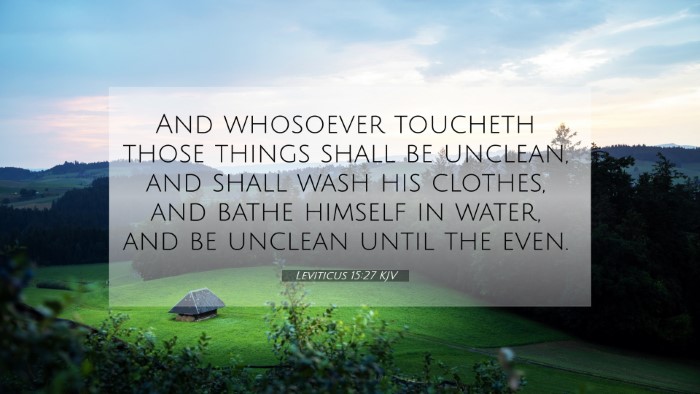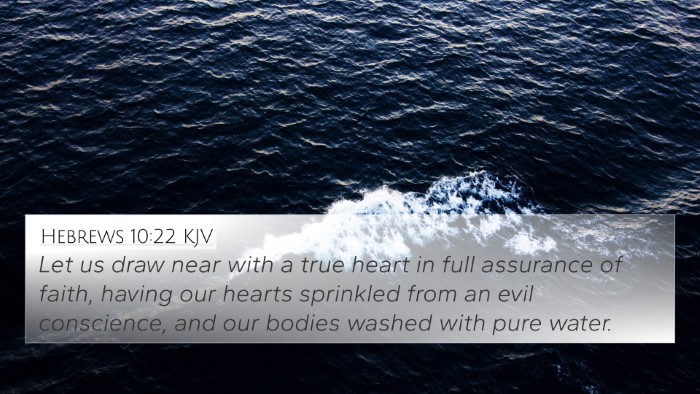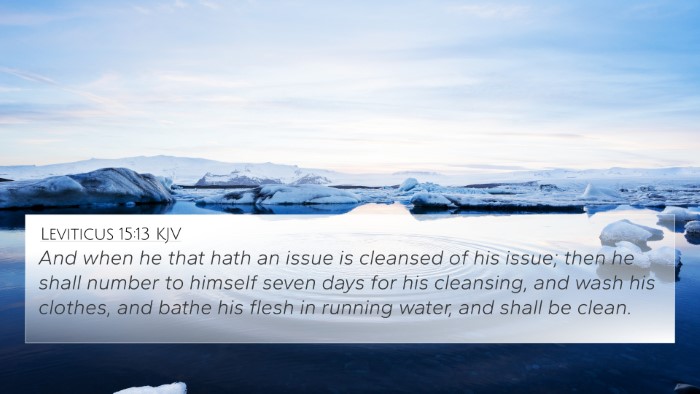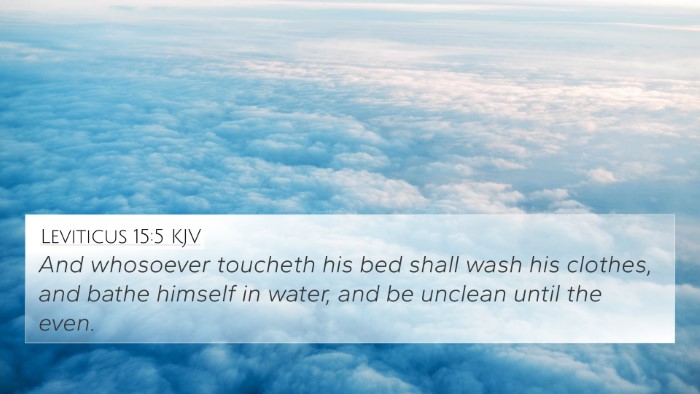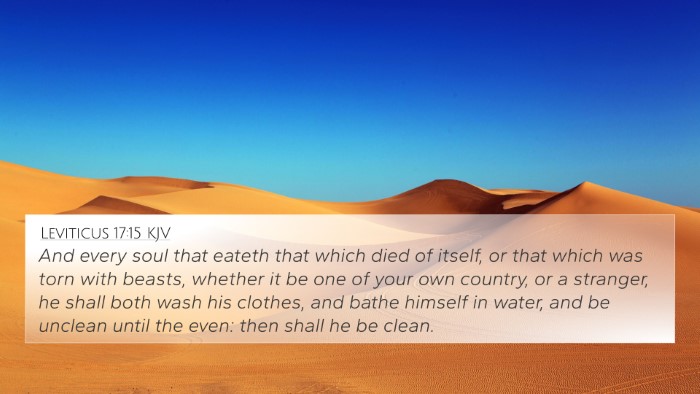Understanding Leviticus 15:27
Leviticus 15:27 states: "And whoever touches those things shall be unclean until evening, and whoever eats of those things shall wash his clothes and be unclean until evening." This verse is part of a section that outlines the laws regarding bodily discharges and the resulting ritual impurities.
Contextual Overview
This passage emphasizes the importance of ritual cleanliness within the community of Israel. Referring to the principles of holiness, it underlines the comprehensive nature of God's laws. The rational behind these laws is to maintain purity in the presence of the Lord.
Insights from Commentaries
-
Matthew Henry points out that the laws given in Leviticus are designed to keep the Israelites distinct as a people set apart for God. The regulations concerning uncleanness are a reminder of the serious nature of sin and its effects on communal worship and purity.
-
Albert Barnes elaborates on the implications of touching impure objects, noting that this not only pertains to physical cleanliness but also symbolizes the need for moral purity. He emphasizes that God's requirement for holiness should provoke self-examination among believers.
-
Adam Clarke comments on the significance of washing clothes and the concept of being unclean until evening, suggesting that there is a time frame for restoration to a state of cleanness, which mirrors the process of repentance and restoration in a believer’s life.
Spiritual Significance
The underlying message of this verse is to remind us of the need for inner purity and the consequences of our actions. Spiritual uncleanness can manifest through our interactions, and we must be aware of how we affect each other in our communal life.
Related Bible Verses
Understanding Leviticus 15:27 can be deepened by examining its connections with other scriptures. Here are several relevant Bible verses that can enhance your understanding:
- Numbers 19:22 - Highlights how touching a corpse renders one unclean.
- Matthew 15:11 - Jesus explains that it is not what enters the mouth that defiles a man, but what comes out of it, linking physical and spiritual defilement.
- Hebrews 12:14 - Urges holiness, as without it, no one will see the Lord. This emphasizes the call to purity that stems from the Old Testament laws.
- 1 Thessalonians 4:7 - Calls on believers to live a life of holiness and sanctification, aligning with the theme of purity found in Leviticus.
- Isaiah 52:11 - Encourages the people to depart from unclean things, reinforcing the importance of maintaining purity.
- Romans 12:1 - Encourages believers to present their bodies as living sacrifices, holy and pleasing to God.
- James 4:8 - Instructs to purify your hearts and draw near to God, showcasing the internal aspect of cleanliness.
- 2 Corinthians 6:17 - Calls out to come out from among them and be separate, applying the themes of purity and holiness into the Christian life.
- 1 Corinthians 7:34 - Talks about the concern for holy living in the context of marriage and personal choices.
- Proverbs 4:23 - Advises guarding one’s heart, which relates to maintaining spiritual cleanliness.
Thematic Connections
In exploring the thematic connections between Leviticus 15:27 and other passages, we recognize a consistent biblical narrative that emphasizes the importance of spiritual purity. Much of the Old Testament law can be referenced alongside New Testament teachings, providing a framework for understanding God’s call to holiness.
Tools for Bible Cross-Referencing
Engaging with Bible verses through cross-referencing can enhance one's study and understanding of the scriptures. Utilizing tools such as a Bible concordance or a Bible cross-reference guide can facilitate a deeper connection and comparative analysis between verses.
Conclusion
In summary, Leviticus 15:27 serves as a crucial reminder of the importance of cleanliness and holiness in the life of a believer. By cross-referencing this verse with others, we can identify the continuous theme of spiritual purity and the implications of our actions on our relationship with God and each other. This creates an inter-biblical dialogue that enriches our understanding and commitment to living in accordance with God's will.


